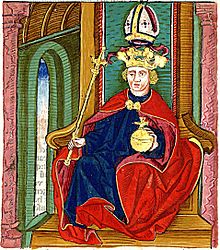Coloman I of Hungary
| Coloman the Learned | |
|---|---|

Coloman depicted in János Thuróczy's Chronicle of the Hungarians
|
|
| King of Hungary | |
| Reign | 1095–1116 |
| Coronation | spring of 1096 |
| Predecessor | Ladislaus I |
| Successor | Stephen II |
| King of Croatia | |
| Reign | 1097–1116 |
| Coronation | 1102 |
| Predecessor | Petar Svačić |
| Successor | Stephen II |
| Born | c. 1070 |
| Died | 3 February 1116 (aged 45–46) |
| Burial | Székesfehérvár Basilica |
| Spouse |
Felicia of Sicily Eufemia of Kiev |
| Issue more... |
Sophia Stephen II of Hungary |
| Dynasty | Árpád dynasty |
| Father | Géza I of Hungary |
| Mother | Sophia |
| Religion | Roman Catholic |
Coloman the Learned, also the Book-Lover or the Bookish (Hungarian: Könyves Kálmán; Croatian: Koloman; Slovak: Koloman Učený; c. 1070 – 3 February 1116) was King of Hungary from 1095 and King of Croatia from 1097 until his death. Because Coloman and his younger brother Álmos were underage when their father King Géza I of Hungary died, their uncle Ladislaus I ascended the throne in 1077. Ladislaus prepared Coloman—who was "half-blind and humpbacked", according to late medieval Hungarian chronicles—for a church career, and Coloman was eventually appointed bishop of Eger or Várad (Oradea, Romania) in the early 1090s. The dying King Ladislaus preferred Álmos to Coloman when nominating his heir in early 1095. Coloman fled from Hungary but returned around 19 July 1095 when his uncle died. He was crowned in early 1096; the circumstances of his accession to the throne are unknown. He granted the Hungarian Duchy—one-third of the Kingdom of Hungary—to Álmos.
In the year of Coloman's coronation, at least five large groups of crusaders arrived in Hungary on their way to the Holy Land. He annihilated the bands who were entering his kingdom unauthorized or pillaging the countryside, but the main crusader army crossed Hungary without incident. He invaded Croatia in 1097, defeating its last native king Petar Svačić. Consequently, he was crowned king of Croatia in 1102. According to the late 14th-century Pacta conventa (the authenticity of which is not universally accepted by scholars), he was only crowned after having ratified a treaty with the leaders of the Croatian nobility. For centuries thereafter, the Hungarian monarchs were also the kings of Croatia.
...
Wikipedia
